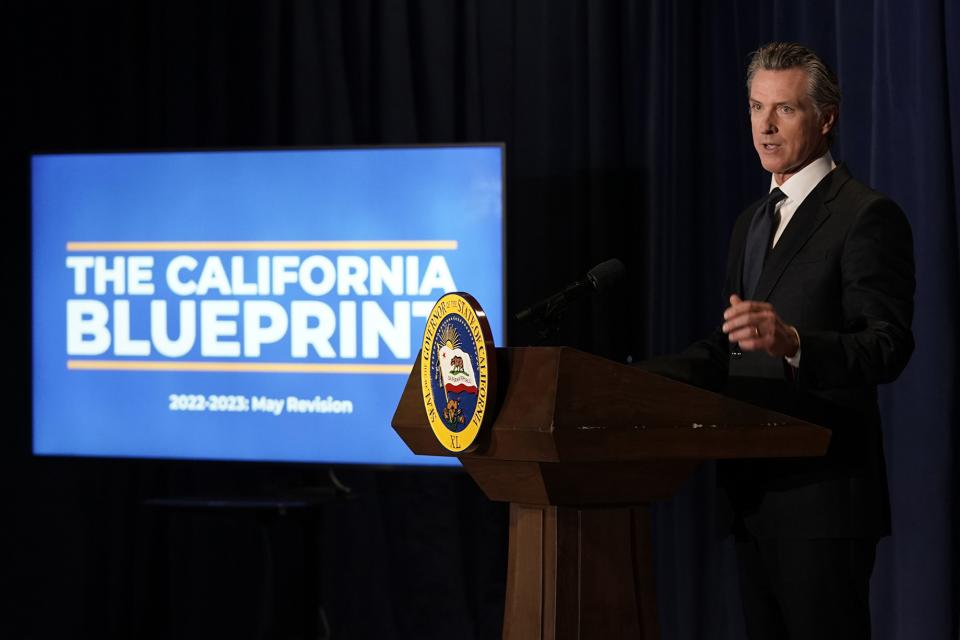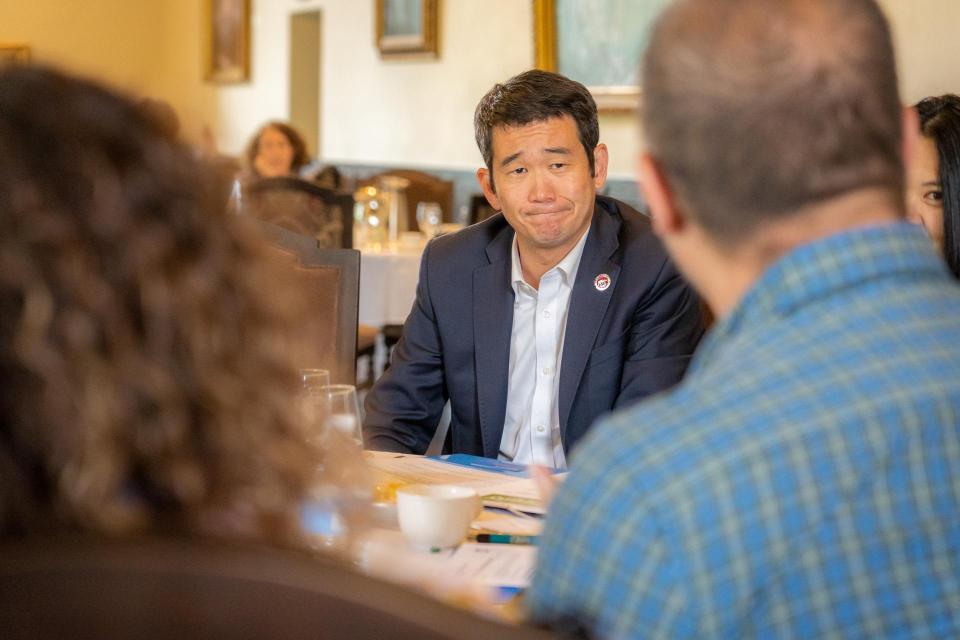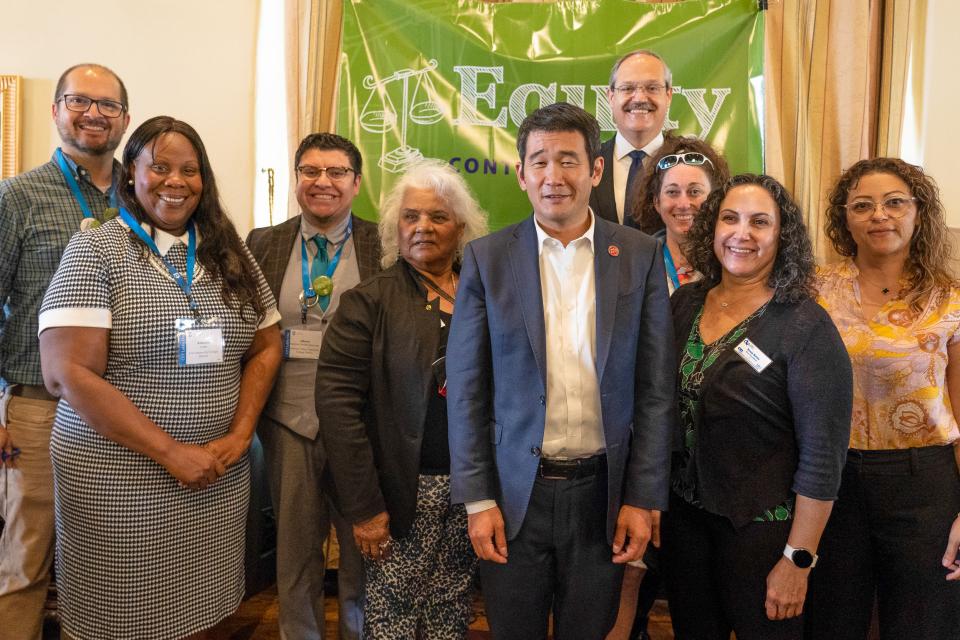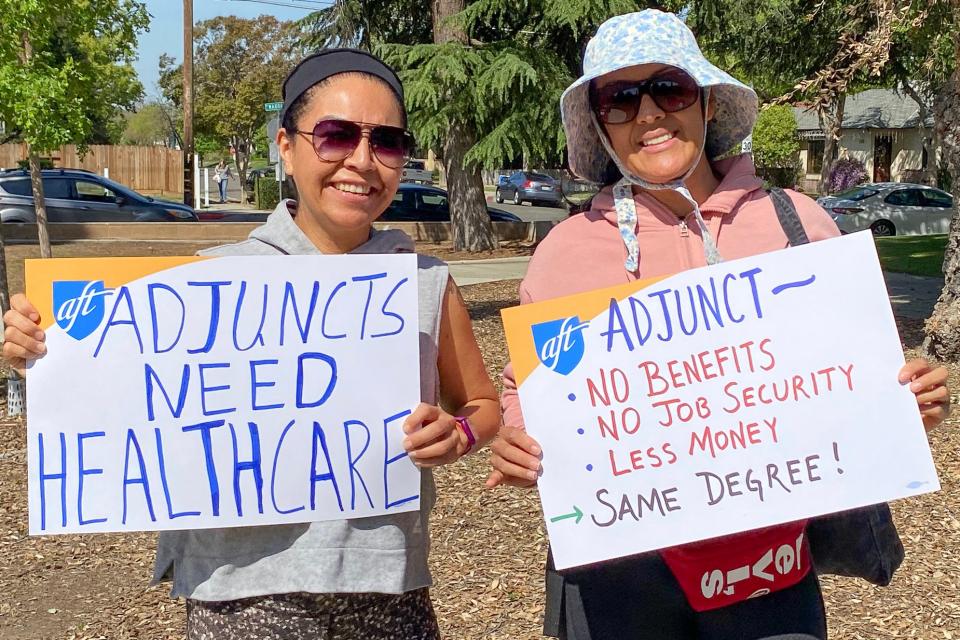Topic: Legislative Action
Legislative Update
The second year of California’s 2023-24 legislative session has come to an end
The 2023-2024 legislative session has come to an end. In all, 2,124 bills were introduced for the 2024 Legislative Session, down from 2,632 introduced last year. Of the bills introduced, there were 1,505 Assembly Bills and 619 Senate Bills. CFT-A Union of Educators & Classified Professionals, AFT, AFL-CIO has successfully sent six sponsored/co-sponsored bills to the Governor, leaving six more sponsored bills either stuck in the Appropriations Committee or on the floor of one of the two houses within the Legislature.
CFT sponsored legislation for 2023-2024 legislative session moves through second Appropriations Committee
INTRODUCTION
Legislative rules require bills that create new fiscal impacts be assigned to the Committee on Appropriations after successful passage from a policy committee. Any bill that is assumed to have over a certain cost is automatically placed on a list, so that each of these bills can be assessed in context of one another as well as the current budget predictions for the next fiscal year.
Governor’s Proposed State Budget for 2024-25
Research Brief
Governor’s initial proposal for 2024-25 budget addresses large deficit without significant cuts or increases to public education funding
On January 10, Governor Newsom presented his initial budget proposal for the upcoming fiscal year. With tax receipts down this year and the late tax deadline last year, the Department of Finance is estimating a $37.9 billion budget deficit in the year ahead. Despite the shortfall, Governor Newsom did not propose significant cuts to education, instead essentially funding K-14 education at a similar level to the current year.
Legislative Update: Newsom’s Proposed State Budget ‘24-25
Initial Overview
January 11, 2024
Governor Newsom presented his initial 2024-25 budget proposal yesterday, with less dire projections than had been anticipated. The $291 billion budget proposal is about 6% smaller than the total 2023-24 budget, and about 8% smaller than the General Fund spending approved in the 2023-24 budget act.
The budget deficit as calculated by the Department of Finance (DOF) is estimated at $37.9 billion for the coming fiscal year; this is about $30 billion lower than the Legislative Analyst projected last month.
Attention High School Teachers: New law protects working students
AB 800 signed into law by Gavin Newsom on September 30, 2023
AB 800 (Ortega), signed into law by Gavin Newsom on September
30, 2023, is an important
breakthrough for the protection of your students on the job
against injury, wage theft and other violations of their rights.
AB 800 mandates a week of “appropriate educational exercises” for all 11th and 12th grade students in the state (public and charter) “that make pupils aware of the role that the labor movement has played in shaping California and the United States.”
Legislative Update
2023-2024
The first year of California’s 2023-24 legislative session has come to an end
This year CFT tracked over 1,300 bills, supporting 160 and opposing 38. Included in these figures are 16 bills that the CFT was either the primary sponsor, or a co-sponsor thereof.
In total, eleven CFT-sponsored or co-sponsored bills reached Governor Newsom’s desk, where six were signed into law, and five were vetoed.
CFT-Sponsored Bills Move Through Legislature
Key legislation passed through the California Assembly in June, advancing to the State Senate for consideration later this summer.
AB 938 increases base funding under the Local Control Funding Formula by 50% to support a 50% raise in TK-12 salaries. The Assembly passed the CFT-sponsored bill by a unanimous 77-0 vote.
AB 1699 prohibits school districts from retaliating against classified staff for refusing or accepting a vacancy. The bill gives employees at least 10 days to apply for a position before the job opens to the public.
CFT-sponsored bills pass first house of Legislature, move on to second
Legislative Update
June 2, 2023 marked the legislative deadline for each California legislative house to pass bills that are introduced in that house. The CFT started the year off with eight sponsored bills, and co-sponsored an additional nine bills. Each bill must pass through a policy committee(s), and the appropriations committee if the bill has significant cost, before being passed off the floor.
Governor’s Proposed State Budget for 2023-24
Research Brief
Governor Newsom started off the 2023-24 budget process on January 10 with a $223.6 billion proposal. Facing lower revenues than expected last year and a budget deficit projected at $22.5 billion by the Department of Finance, the January budget proposal is cautionary. Since the 2022-23 enacted budget anticipated a different budgetary landscape and included significant one-time expenditures, the governor’s initial proposal includes few cuts to education and does not draw on the available rainy-day reserves. Protecting education funding, the proposal also fully funds the statutory COLA, which is estimated at 8.13% at this time.
CFT to sponsor essential legislation for 2023-2024 legislative session
Legislative Update
INTRODUCTION
With the 2023-2024 California Legislative Session beginning, the CFT will be engaging in a new environment at the state Capitol. With several education champions reaching their term limits, and a large sector of the legislative staff turning over, the Legislative Department will be focusing on building new relationships with newly-elected legislators and their staff.
CFT’s due process bill succeeds, puts classified on even footing with faculty
Summer Assistance expands to community college staff, Juneteenth becomes official school holiday
Governor Newsom capped the 2020-22 legislative session by signing a flurry of bills that CFT sponsored, co-sponsored or supported. Senate and Assembly bills with strong bearing on classified employees ranged from due process during workplace appeals, to a fair repayment plan for accidentally overpaid wages.
Following are the new laws CFT fought to win for classified employees and paraprofessionals.
Legislative high and low for part-time faculty
Healthcare funding increased in state budget, but higher workload cap vetoed
California community college adjuncts saw the single greatest gain for part-time faculty ever—$200 million in ongoing annual funding for part-time faculty healthcare—but felt bitter disappointment when CFT’s sponsored bill to lift the teaching cap to 85% of a full-time load died for a second time on Governor Newsom’s desk.
Governor signs six CFT bills, plus budget trailer bills with union priorities
Legislative Update
Governor Newsom signed six union bills at the end of September that the CFT successfully lobbied in both houses of the Legislature. The CFT had sponsored or co-sponsored 16 legislative bills alongside several budget proposals in the last year of the 2020-22 legislative session. A majority of these priorities made it to the governor’s desk or were included in the state budget, with only one bill being vetoed by the governor.
What budget trailer bills mean for education workers
Legislative Update
On September 30, Governor Newsom signed the final budget trailer bills sent to him by the Legislature after passing the bills and a “budget junior” on August 31. Budget trailer bills are created by the Committee on Budget to provide technical language for the implementation of fiscal allocations. The budget junior bill includes additional allocations as well as additional items necessary for implementation of some July budget expenditures.
The budget-related bills go into effect immediately. CFT priorities in the budget trailer bills are listed below.
Governor extends COVID paid sick leave through end of 2022
New extension will sunset on December 31, 2022
Governor Newsom signed AB 152 on September 29, extending COVID-19 Supplemental Paid Sick Leave through the end of the year for California workers. This protection was originally set to expire on September 30.
This extension does not come with additional sick leave but instead gives workers access to any of their remaining COVID-19 Supplemental Sick Leave through December 31, 2022.
State budget continues record funding for public education, secures funding for part-time faculty healthcare
Legislative Update
Funding for part-time community college faculty healthcare secured
Governor Newsom signed the final state budget on Friday, June 30 after the governor and state legislators reached agreement on the 2022-23 budget over the weekend. The deal includes record levels of funding for public education and the $200 million to support part-time faculty healthcare that CFT has been championing throughout this budget process.
CFT-sponsored bills pass first house of Legislature, move on to second
Legislative Update
The “house of origin” deadline marks a major hurdle for bills to pass out of their first house of the Legislature and move on to the second. The CFT was able to move its 18 sponsored and co-sponsored bills before the deadline with only a couple of exceptions.
- CFT-Sponsored Bills: The 18 union-sponsored and co-sponsored bills with brief descriptions, bill status, and links to the bill text.
- All Legislation CFT is Monitoring: Find CFT’s position on these 626 bills.
Part-timers and allies lobby legislators for healthcare, pay parity
PHOTO GALLERY
Students and full-time faculty join forces with part-time faculty
From the Bay Area to San Diego, and from the Central Valley to the Mojave Desert, part-time community college faculty, along with full-time faculty and student allies, gathered at Sacramento’s famed Sutter Club on Monday morning, May 1, to go forth and make California legislators aware of the critical need for part-time faculty healthcare and pay parity.
A “red letter year” for CFT legislation in support of contingent faculty
Healthcare insurance, teaching load, rehire rights, and parity
COVID and the subsequent student enrollment drop during the last two semesters have placed great burdens on contingent faculty, from scrambling to teach remotely to negotiating personal and family challenges to facing reduced assignments and a loss of healthcare benefits.




































